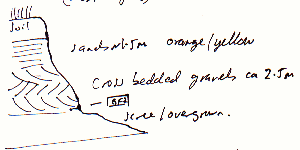
Mike Horne FGS
Geological fieldwork
taking notes in the field
tutor: Mike Horne FGS
University of Hull - Centre for Lifelong Learning
The whole point of geological fieldwork is to observe the geology - rocks, fossils, minerals, structure, stratigraphy .... and making notes of the observations are important for three reasons - you have a permanent record that you can refer to (rather than rely on your memory), making notes forces you to think about the geology in a systematic way and your observations may be important to future geologists.
How you do it is a matter of personal taste and a function of your geological interests. Here are some ideas:-
Practicalities - you should have a note book that will last a long time and be able to use it in all weather conditions. I would recommend a hard backed note book that will fit into your pocket and that you take a pencil with you and a large clear plastic bag. Because you can write on a damp surface with a pencil but not a ball-point pen, and you can put your notebook inside the plastic bag and carry on writing when the rain is pouring down.
As well as your note book you may want to take a clipboard with plain paper (for detailed drawings and diagrams), logging sheets (for stratigraphic work) or base maps (for geological mapping).
What to put in your note book - the aim is to record your observations and include things that would jog your memory about the visit to the site. So I would include the date, the name of the site, the national grid reference, the circumstances (e.g. who I was with, why I was there, anything unusual that happened) and the general geology as a starting point. If it was my first visit to the site I would also include some details of how I found the site, contact details for the landowner to get permission for future visits and a plan of the site. If I had been there before I would note any changes to the site.
The detailed part of the notes would depend on what I did at the site, for example-
On a general purpose visit - the rocks, the fossils, the structures, the relationship to the landscape.
To collect rocks, minerals or fossils - a list of the specimens seen and those collected.
For stratigraphy - detailed measurements of the site, if possible starting at the bottom, including the sample number of any specimens collected.
For a 'boulder survey' - a simple list of the erratics seen, in the order they are seen (which in itself is an indicator of frequency) and some details of which ones are common or rare.
Always include as much detail as possible. Remember that a picture or diagram can record more information than written descriptions. Drawings, photographs and rubbings are good ways of recording details without having to collect the specimen so that you can leave it for others to appreciate. Make a note of other forms of information you have gathered - details of photographs, sediment samples, horizons that your fossils came from ..... And make a note of anything unusual (not necessarily geological) that will help to jog your memory in the future - weather, wildlife, seeing a space ship, breaking your arm, ... anything that will jog your memory.
It is good develop a set of things that you write in your books routinely (though what you include will depend on your geological speciality) and by developing a methodical approach you can save yourself the need for repeat visits because you remembered something that you forgot to observe previously.
Remember it is a field note book - it is a practical tool; your notes don't have to be neat and pretty (and please note young geology students - it does not have to look grubby, so there is no need to smear the pages with mud to make it look as if the fieldwork was hard work!).
And when you get back home - then consider cross-referencing your note book with other information - such as the photograph numbers (if you catalogue them), catalogue numbers that you give the specimens you collected, relationships with other sites or stratigraphy, references to publications .....
copyright Mike Horne - 2019
Hull Geological Society Home Page Geology Courses Homepage